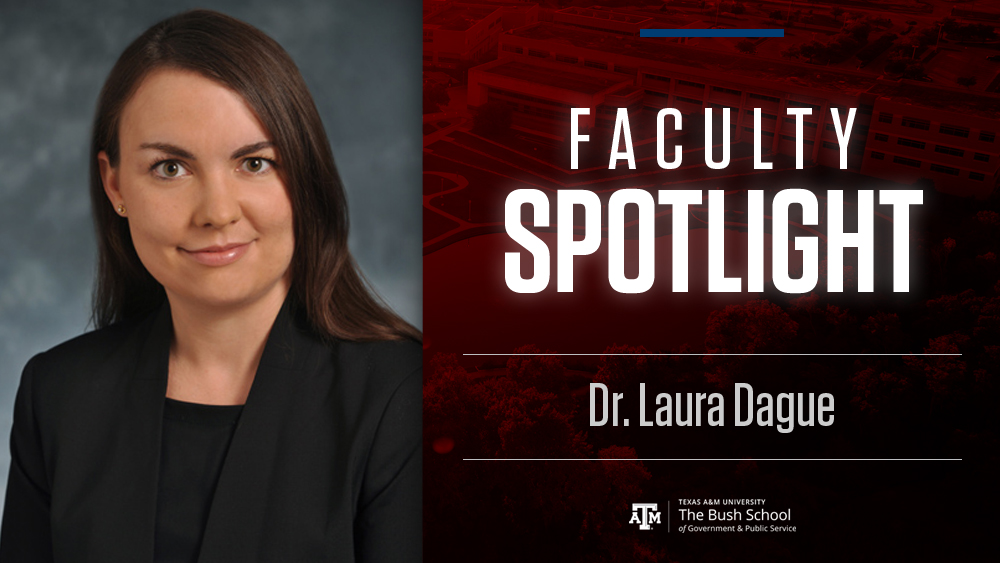
Dr. Laura Dague, an assistant professor in the MPSA program, earned a PhD in economics from the University of Wisconsin, where she was associated with the Population Health Institute and the Institute for Research on Poverty. Her doctoral fields of study were public economics and labor economics. Dr. Dague’s research interests are in health economics and applied microeconomics, more specifically in the structure of insurance markets, prices, and price-setting, and how these affect people’s decisions about health insurance.
A member of Phi Beta Kappa, Dague received a dissertation research award from the Institute for Research on Poverty, and was a Fellow at the Federal Reserve Bank of Chicago. Dr. Dague’s research team has been funded by the Robert Wood Johnson Foundation, the UC Davis Center for Poverty Research, the W.E. Upjohn Institute for Employment Research, and the State of Wisconsin Department of Health Services.
“The more you know, the less things are a mystery; so it’s best to know about markets in actuality,” Dague said. “This includes looking at whether policy decisions make people better or worse off.”
Her recent publications focus on changes in the Medicaid program and their relation to federal healthcare reform. She’s currently considering how Medicaid enrollees respond to premiums and copayments, the relationship between Medicaid and the private insurance market, and the effects of expanding Medicaid to nontraditional populations, such as low-income adults without dependent children. She is also investigating how the structure of the health insurance market in Chile affects insurance demand and usage of health care services. Her work has been published in Health Affairs, Health Services Research, and Medicaid and Medicare Research Review.
Dr. Dague also studies policy implications from the Affordable Care Act and how Medicaid will affect people’s choices, and notes that no one really knows yet what the data will be or what it will show.
In summary, Dr. Dague says her research looks at how public policy affects health insurance and how policy affects people’s decisions. “Fundamentally, my research draws on the basic principles of economics—elasticities and models based on the estimation of social welfare,” Dague said. Her interest in this line of research was piqued after President Obama’s election, and she thought about all of the issues to be tackled.
While working for her state representative in Kansas during her undergraduate studies, Dr. Dague would often wonder where ideas discussed in committee meetings came from. “A professor encouraged me to take more economics classes, and I realized that I think about the world in terms of people’s incentives because it’s very logical,” Dague said.
Her current publications include articles on how health insurance expansions affect low-income families and the use of auto-enrollment in Medicaid programs. In a June 2013 article in Health Affairs, Dague focused on healthcare usage in the State of Wisconsin following an expansion of coverage to childless adults. Her research also looks at healthcare in Chile and issues of price discrimination based on sex and age. Dr. Dague’s research on health insurance and labor supply was recently cited by the Congressional Budget Office in the Budget and Economic Outlook.
At the Bush School, Dr. Dague teaches courses in economic analysis, public finance, and healthcare policy.
“What is rewarding about teaching isn’t being in front of the classroom, but the relationships I build with my students,” Dague said. “I think teaching can be especially fun when we look at something new in the literature and connect it with something else that’s current and interesting.” Dague focuses on building transferable skills for her students. She also wants them to learn how economists think about and talk about things. In public finance, she allows her students to focus on a particular policy area, while in her health policy class, Dr. Dague emphasizes development of analytical skills.
She has some advice for students: “I think it’s important not to be afraid of quantitative analysis. Understanding quantitative approaches can be key to knowing what you can reasonably believe. At least know where statistics come from and how to interpret them. I think it’s fun to be at a place where my students will soon have jobs that put them in a position to be making decisions.”
Dr. Dague said she really enjoys being at the Bush School because the students are serious and have specific goals, one of the best things about teaching graduate students. She also enjoys being part of an institution where outstanding speakers are often on campus as well as other intellectual events.
“It’s also fun to be at a place where my colleagues have different interests but all care about the same things,” Dague said.
In addition to her work, Dague enjoys knitting, golf, traveling, and spending time with her husband.